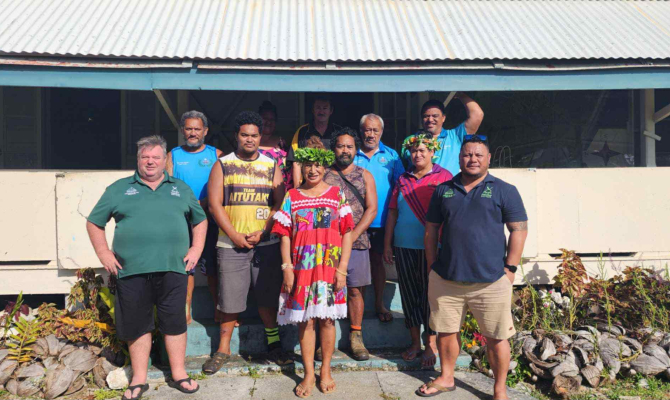
30 June 2025, Mauke, Cook Islands - The people of Mauke are stepping up efforts to combat the invasive red passionfruit vine (Passiflora rubra), a fast-growing threat to the island’s environment and cultural heritage.
Through a formal partnership signed in February 2025, the Cook Islands and the Secretariat of the Pacific Regional Environment Programme (SPREP), with support from the Pacific Regional Invasive Species Management Support Service (PRISMSS), are working together to implement the Resilient War on Weeds (WOW) and Resilient Ecosystems Resilient Communities (RERC) programmes on Mauke, Rarotonga, and Atiu.
The collaboration aims to support communities in managing invasive species by providing technical assistance, tools, and training tailored to local priorities. For Mauke, the red passionfruit vine, capable of smothering native plants and strangling mature trees, was identified as a key target.
“This plant poses a serious ecological threat,” said Ms. Raita Moetaua, Extension Officer for the National Environment Service (NES) in Mauke.
“We’ve previously introduced the Red Postman Butterfly as a biocontrol agent, but it’s clear that more direct intervention is needed.”
The vine’s spread is particularly damaging to the native maire plant, a culturally significant species used to make ei maire—fragrant garlands worn during important ceremonies. Maire is also a key ingredient in the traditional Mauke Miracle Oil, known for its skin-healing properties.
To support the island’s efforts, a SPREP-PRISMSS technical team visited Mauke from 13–18 June to assess the situation and provide hands-on training. Activities included the delivery of herbicide equipment, guidance on safe application techniques, and a delimiting survey to map vine infestations and plan targeted control in new areas.
“Invasive species are the leading cause of biodiversity loss in the Pacific,” said SPREP Invasive Species Adviser, Mr. David Moverley. “This work is not just about saving plants, it’s about safeguarding the cultural and environmental identity of islands like Mauke.”
Local leader and Mayor of Mauke Island Joanne Stephens expressed strong support for the initiative. “We welcome this partnership with open arms,” said the Mayor.
“Protecting our native plants like maire means protecting who we are as a people. Our community is ready to do its part in restoring our island’s natural resources.”
To ensure the safe and responsible application of herbicides and weed control measures, SPREP and NES have prioritized health and safety. All equipment is used in accordance with best practices, and field teams have received practical training on personal protective equipment (PPE), safe handling procedures, and environmental safeguards.
These measures ensure that both community well-being and ecosystem integrity are upheld throughout the project.
The programme emphasises community participation, ensuring that local knowledge and ownership remain central to the project’s success. With tools in hand and community backing, Mauke is prepared to reclaim its landscapes and restore its cherished natural resources.
--------------------------------------------------------------------------------------------------------------------------
About PRISMSS: The Pacific Regional Invasive Species Management Support Service (PRISMSS) is a coordinating mechanism designed to facilitate the scaling up of operational management of invasive species in the Pacific. PRISMSS brings together experts to provide support within the Pacific region with a focus on protection of indigenous biodiversity and ecosystem function. As a service provider, PRISMSS provides a comprehensive suite of support services in a cohesive, effective, efficient, and accessible manner to Pacific Island countries and territories.
Restoring Island Resilience (RIR): The PRISMSS - Restoring Island Resilience (RIR) is a New Zealand-PRISMSS collaboration project that aims to improve Pacific Island Countries and territories livelihoods and resilience to climate change by reducing the impact of invasive species on natural and agricultural ecosystems through the six PRISMSS programmes.
PRISMSS Powered by: New Zealand Foreign Affairs & Trade, UK International Development, GEF, UNEP & SPREP.
PRISMSS Partners: Birdlife International, NZ Department of Conservation, Island Conservation, Manaaki Whenua Landcare Research, National Institute of Water and Atmospheric Research, Pacific Community and SPREP.
Resilient Ecosystems, Resilient Communities (RERC) Programme: RERC programme, led by the Secretariat of the Pacific Regional Environment Programme (SPREP) Invasive Species Team and BirdLife International, integrates community involvement in ecological restoration, ensuring that resilient ecosystems provide direct benefits to local communities. By managing invasive species and reintroducing native species, we create sustainable environments where both nature and people thrive together.
PRISMSS Programmes: Natural Enemies Natural Solutions (NENS), Predator Free Pacific (PFP), Protect Our Islands (POI), Protect Our Marine Areas (POMA), Resilient Ecosystems Resilient Communities (RERC), War On Weeds (WOWs)
For additional information please contact
Mr Dominic Sadler, PRISMSS Manager on [email protected]
Mr Nitish Narayan, PRISMSS Communications & Liaison Officer on [email protected]